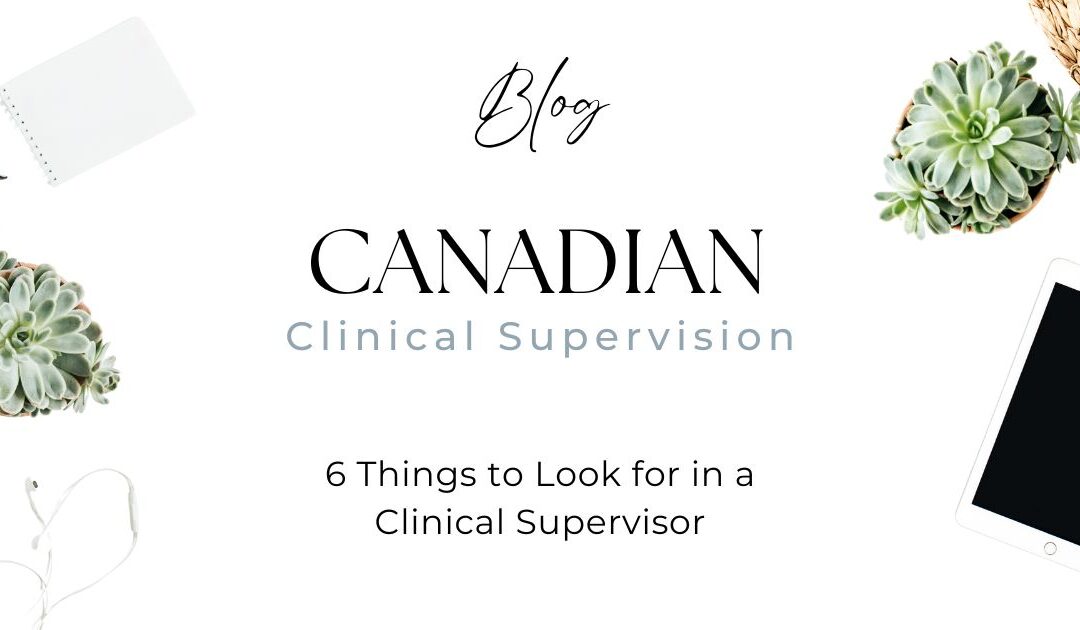Finding a clinical supervisor can be both exciting and stressful. It’s exciting to find someone who can help you grow as a practitioner. But as it can be challenging to find a clinical supervisor, sometimes, it’s easier to just take the first one you find that has a spot available. But then, you quickly realize that they’re not a fit for you, your learning style, or your practice.
As a therapist, you know that being a good fit with clients builds the therapeutic relationship, and the supervisory relationship is no different. When choosing a clinical supervisor, you can improve your chances of finding the right fit by knowing 6 key areas of the clinical supervisor’s practice. This article explains 6 things to look for in a clinical supervisor so that you find the right fit the first time.
1. Educational Background
First of all, identify the educational background of the clinical supervisor. Although, this might seem like a no-brainer, it’s important to know if the clinical supervisor has the educational background that aligns with your educational background. Although, it’s not always necessary for therapists to be supervised by someone who has the same education as them, it is important to ensure that there is an alignment in practice. For example, if you’re a social worker working with a clinical supervisor who has a physiotherapy background then there may be a misalignment in scope of practice. However, if you’re a social worker and the clinical supervisor is a psychologist this may be a better fit.
In addition, if the clinical supervisor has a different educational background than you, it’s important to know your regulatory body’s expectations or requirements around receiving clinical supervision or consultation from professionals who have a different educational background than yours. Although some regulatory bodies have a more autonomous approach allowing their members to choose clinical supervisors or consultants with minimal restrictions, other regulatory bodies have stricter requirements only allowing clinical supervision to be provided by professionals who hold specific designations, trainings, and/or years of experience. So, how you choose a clinical supervisor depends on your regulatory body’s clinical supervision requirements.
2. Professional Designations
In addition to educational background, determine the clinical supervisor’s professional designations. This might include regulatory designations or advance training designations. For example, if you’re a Registered Social Worker (RSW) in Alberta or BC, and you’re working towards obtaining the Registered Clinical Social Worker (RCSW) designation, you might choose to look for clinical supervisors who not only have a social work degree but also the RCSW title and has passed the ASWB Clinical Exam. Or perhaps you’re a psychotherapist working towards your EMDR certification and you need a clinical supervisor who has an EMDR Consultant™ designation so that you can work towards your consultant hours. In these cases, you’ll need someone who has specific designations and advanced training.
In addition to advance trainings, it’s important to determine if the clinical supervisor is registered or licensed with a particular regulatory body and in good standing. You should never assume just because someone has a higher level of education that they are in good standing with their regulatory body and hold the appropriate designations. Most regulatory bodies have a public database with the names and registration numbers of their members. It’s good practice to double-check these registries prior to meeting with a clinical supervisor to determine their current status.
3. Practice Experience
It’s also important to know your prospective clinical supervisor’s areas of practice, years of practice experience, and experience providing clinical supervision. Depending on your profession, your regulatory body may or may not have specific guidelines regarding who can or should provide clinical supervision. In Canada, most regulatory bodies agree that clinical supervision is not an entry-level profession. In fact, the Canadian Counselling and Psychotherapy Association (CCPA) requires clinical supervisors to have a minimum of five (5) years’ experience post-masters before being eligible for the Canadian Clinical Supervision Certification.
However, practice experience isn’t just about the number of years a clinical supervisor has been in the field. It’s also about their experience working with specific types of clients, specifically the clients that you work with. If you’re a therapist working with children, then look for a clinical supervisor who has the experience, expertise, and skills to help you navigate the clinical and ethical situations that may arise when working with children and their parents. A clinical supervisor who has a specialized skillset to help you navigate complex client cases also helps you enhance client-care.
4. Theoretical Orientation & Therapeutic Modalities
Next, learn the clinical supervisor’s theoretical orientation. In other words, which framework(s) do the clinical supervisor use to inform their therapy interventions and therapeutic modalities? More importantly, determine if the clinical supervisor’s theoretical orientation aligns with your own. As your clinical supervisor’s advice is based on their theoretical orientation, an alignment between theoretical orientations is essential for promoting the best client care.
If you’re new to the counselling field, you may still be dabbling with various theoretical orientations to determine which is the best fit for you. If you have not yet adopted a theoretical orientation, choose a clinical supervisor who uses similar therapeutic modalities as you. In my opinion, having a clinical supervisor who works from the same theoretical orientation is an essential component for skill development, client case planning, and achieving a positive supervisor-supervisee relationship.
5. Style of Supervision
When deciding on a clinical supervisor, consider asking them to explain their style of supervision. Style of supervision may include the methods they use to deliver supervision sessions, the supervision structure, the supervision requirements, and their personality. Although, you may be able to gather some of this information on directories or website; usually, determining a clinical supervisor’s style of supervision requires a meet-and-greet to determine best fit. Some clinical supervisors offer a free consultation which can help you get a better idea if their style works for you.
6. Accessibility
Finally, look for a clinical supervisor who is accessible. For clinical supervision to be successful you’ll need to make a commitment to the supervisor-supervisee relationship. If accessibility is a barrier for you, then follow-through with clinical supervision can become challenging. As accessibly differs person-to-person, consider what your needs are and search for a therapist who ticks most of those boxes. Accessibility may include the clinical supervisor’s hours of operation, methods of clinical supervision, distance from your home, physical aspects of their office space, as well as their policy around impromptu sessions for emergent client situations.
Conclusion
Now, that you know the 6 things to look for in a clinical supervisor, it’s time to put them into practice and start your search for a clinical supervisor who best aligns with you and your practice. Find a clinical supervisor who has the educational background, professional designations, and practice experience that will help you build your clinical skills. A clinical supervisor who works from a theoretical orientation similar to your own. A clinical supervisor who has a style of supervision that matches with your learning style. And a clinical supervisor who is accessible. Check out the Canadian Clinical Supervision therapist directory to find your next clinical supervisor.

